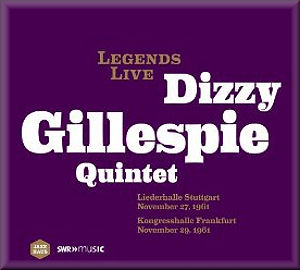1. The Mooche
2. Con Alma
3. Willow Weep For Me
4. Oops-Shoo-Be-Doo-Be
5. I Can't Get Started
6. Kush
7. Con Alma (Alternate Take)
Dizzy Gillespie - Trumpet
Leo Wright - Alto sax, flute
Lalo Schifrin - Piano
Bob Cunningham - Bass
Mel Lewis - Drums
In his biography of Dizzy Gillespie entitled Groovin' High: The Life Of Dizzy Gillespie Alyn Shipton writes: "When Dizz died in January 1993, the world lost the man who had taken over Louis Armstrong's role as the father figure of the music; it also lost one of the major innovators in what became known as the modern jazz or `bebop' revolution of the 1940s".
The Dizzy Gillespie Quintet of November 1961 was an absolutely stellar aggregation and in top form for these live concerts in the Liederhalle Stuttgart and Kongresshalle Frankfurt. Starting off with The Mooche, which Duke Ellington had written for trumpeter Bubber Miley, the band examines the structure at length, with Dizzy's extensive runs and phrasing seeming to go for several bars without a breath. Pianist Lalo Schifrin has a lengthy solo which is chock full of block chords all of which add to the remarkable passion of the piece. At this point, Schifrin had been with the band for about a year and had composed one of Gillespie's signature suites called Gillespiana. Demonstrating that he was a creative pianist and an imaginative composer, Schifrin remained with the band for about another year, and then went to California where he became one of the most prolific and sought-after composers of movie and TV music.
Gillespie's own familiar piece Con Alma is given a double dose here which is somewhat regrettable since there is very little to choose between them. The Afro-Cuban structure is one that Dizzy embraced and was an integral part of his performances. Following a protracted block chord solo by Schifrin, Dizzy embarks on one of his typical solo flights full of soaring high notes and lyrical pithiness. Leo Wright is one of those lesser-known musicians who was nevertheless a highly-regarded bop-influenced alto saxophonist. His solo work throughout the album is exemplary but is especially buoyant in this piece. The following track Willow Weep For Me is a tour de force for Wright's flute playing and he was by all measure one of the finest flutists in jazz. He is at his lyrical best here.
While he was never thought of as a ballad-playing trumpeter, Gillespie indeed had a soft side which he demonstrates with fluidity and warmth on I Can't Get Started. Gillespie's muted trumpet had always been an important part of his versatility and he displays it to perfection on his own composition Kush. In an extended interplay between bassist Bob Cunningham and drummer Mel Lewis, he dances and prances over the rhythmic undercurrent in a virtuoso performance. In addition both Wright and Schifrin deliver far-reaching solos with rhythmic aggression.
This is a welcomed addition to the JazzHaus recordings.
Pierre Giroux
